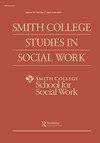Editorial
IF 0.9
Q2 SOCIAL WORK
引用次数: 0
Abstract
We are living through turbulent times in the nation’s history. Faced with many serious problems that range from the effect of climate change on our environment, the rise in gun violence especially mass shootings, humane immigration policy, education and election integrity, we are being challenged to dig deep into our souls and to struggle with the nuances of different policy positions. Each of these are serious policy issues with long histories and new complications. Policy issues are always two-sided issues that reflect value choices and political power. Neither set of value choices is the right one or the wrong one, each has intrinsic worth and significance, because the choices we make today will effect the future. Over the last four years, we’ve been challenged to examine the pros and cons of the policies put forth by the Trump Administration beginning with the travel ban imposed on Muslims from five predominately Muslim countries, an Executive Order directing federal funding for the construction of a wall along the Mexico and US border and calling for an end to the abuses of parole and asylum provisions of immigration law and building facilities to hold undocumented immigrants near the Mexican border. Later we were jolted into an alternative reality of zero tolerance policies and the separation of Latina children from their families, the official policies of the Department of Homeland Security and the Trump Administration. Many of these policies violate the very ethical standards that social workers pledge to follow, creating ethical and moral dilemmas for those who work with the populations directly affected. Now Donald Trump is the third sitting President who has been impeached by the House of Representatives, where a majority of the representatives are Democratic. The President has been charged with two articles of impeachment: one on abuse of power, the other obstruction of Congress. The first pertains to Trump’s attempt to get the President of Ukraine to announce an investigation of Joe Biden, the President’s political rival, Biden’s son Hunter Biden and Burisma, a Ukrainian gas production company. House Democrats accuse the President of betraying public trust by withholding $391 million in military aid to Ukraine in exchange for the investigation. They further argue that the President placed his own interests above those of the country. He was seeking to serve his own interests rather than those of the country. In doing so, Trump abused his power as President. Obstruction of Congress was the second charge. Trump defied subpoenas to provide testimony issued to members of his Administration and refused to release documents requested by the House Intelligence Committee. Presidents are not immune from responding to subpoenas. The full House will vote on the impeachment charges in the next week; if a majority favors the charges then the Senate will hold a trial. The Republicans counter these charges by arguing that the President did nothing wrong. Trump asked the Ukraine President to announce an investigation with valid concerns about corruption; Biden was not a factor. Trump was not trying to undercut Biden politically or to advantage himself with information he could use in the 2020 Presidential campaign against his rival. The Republicans argue that the military funds authorized by Congress to assist with the war between Ukraine and Russia were released therefore there was no attempt to bribe anyone. They (the Republicans) also decry the impeachment process. It (the impeachment process) was unfair. It did not permit SMITH COLLEGE STUDIES IN SOCIAL WORK 2019, VOL. 89, NOS. 3–4, 197–199 https://doi.org/10.1080/00377317.2019.1706318编辑
我们正经历着这个国家历史上的动荡时期。面对许多严重的问题,从气候变化对我们环境的影响,枪支暴力特别是大规模枪击事件的增加,人道的移民政策,教育和选举诚信,我们面临着深入挖掘灵魂和与不同政策立场的细微差别作斗争的挑战。每一个都是具有悠久历史和新的复杂性的严重政策问题。政策问题总是反映价值选择和政治权力的两面性问题。这两套价值选择都不是正确的,也不是错误的,每一套都有内在的价值和意义,因为我们今天所做的选择将影响未来。在过去的四年里,我们一直面临着审查特朗普政府提出的政策的利弊的挑战,从对来自五个以穆斯林为主的国家的穆斯林实施旅行禁令开始,一项行政命令,指示联邦政府为在墨西哥和美国边境修建隔离墙提供资金,并呼吁停止滥用移民法中的假释和庇护条款,并在墨西哥边境附近建造关押无证移民的设施。后来,我们陷入了另一个现实,即零容忍政策和将拉丁裔儿童与家人分离,这是国土安全部和特朗普政府的官方政策。其中许多政策违反了社会工作者承诺遵守的道德标准,给那些与直接受影响人群合作的人带来了道德和道德困境。现在,唐纳德·特朗普是第三位被众议院弹劾的在任总统,众议院的大多数代表都是民主党人。总统被控两项弹劾条款:一项是滥用职权,另一项是妨碍国会。第一个涉及特朗普试图让乌克兰总统宣布对总统的政治对手乔·拜登、拜登的儿子亨特·拜登和乌克兰天然气生产公司Burisma进行调查。众议院民主党人指责总统拒绝向乌克兰提供3.91亿美元的军事援助以换取调查,背叛了公众的信任。他们进一步辩称,总统将自己的利益置于国家利益之上。他想为自己的利益服务,而不是为国家的利益服务。这样做,特朗普滥用了他作为总统的权力。妨碍国会是第二项指控。特朗普无视向其政府成员提供证词的传票,拒绝公布众议院情报委员会要求的文件。总统也不能不回应传票。众议院全体议员将在下周就弹劾指控进行投票;如果多数人赞成这些指控,那么参议院将进行审判。共和党人反驳了这些指控,认为总统没有做错任何事。特朗普要求乌克兰总统宣布对腐败问题进行调查;拜登不是一个因素。特朗普并没有试图在政治上削弱拜登,也没有试图用他可以在2020年总统竞选中用来对抗对手的信息来利用自己。共和党人辩称,国会授权协助乌克兰和俄罗斯之间战争的军事资金已经发放,因此没有贿赂任何人的企图。他们(共和党人)也谴责弹劾程序。这(弹劾程序)是不公平的。它不允许史密斯学院社会工作研究2019,第89卷,编号3–4,197–199https://doi.org/10.1080/00377317.2019.1706318
本文章由计算机程序翻译,如有差异,请以英文原文为准。
求助全文
约1分钟内获得全文
求助全文
来源期刊

SMITH COLLEGE STUDIES IN SOCIAL WORK
SOCIAL WORK-
CiteScore
1.50
自引率
10.00%
发文量
10
期刊介绍:
Smith College Studies in Social Work focuses on the vital issues facing practitioners today, featuring only those articles that advance theoretical understanding of psychological and social functioning, present clinically relevant research findings, and promote excellence in clinical practice. This refereed journal addresses issues of mental health, therapeutic process, trauma and recovery, psychopathology, racial and cultural diversity, culturally responsive clinical practice, intersubjectivity, the influence of postmodern theory on clinical practice, community based practice, and clinical services for specific populations of psychologically and socially vulnerable clients.
 求助内容:
求助内容: 应助结果提醒方式:
应助结果提醒方式:


